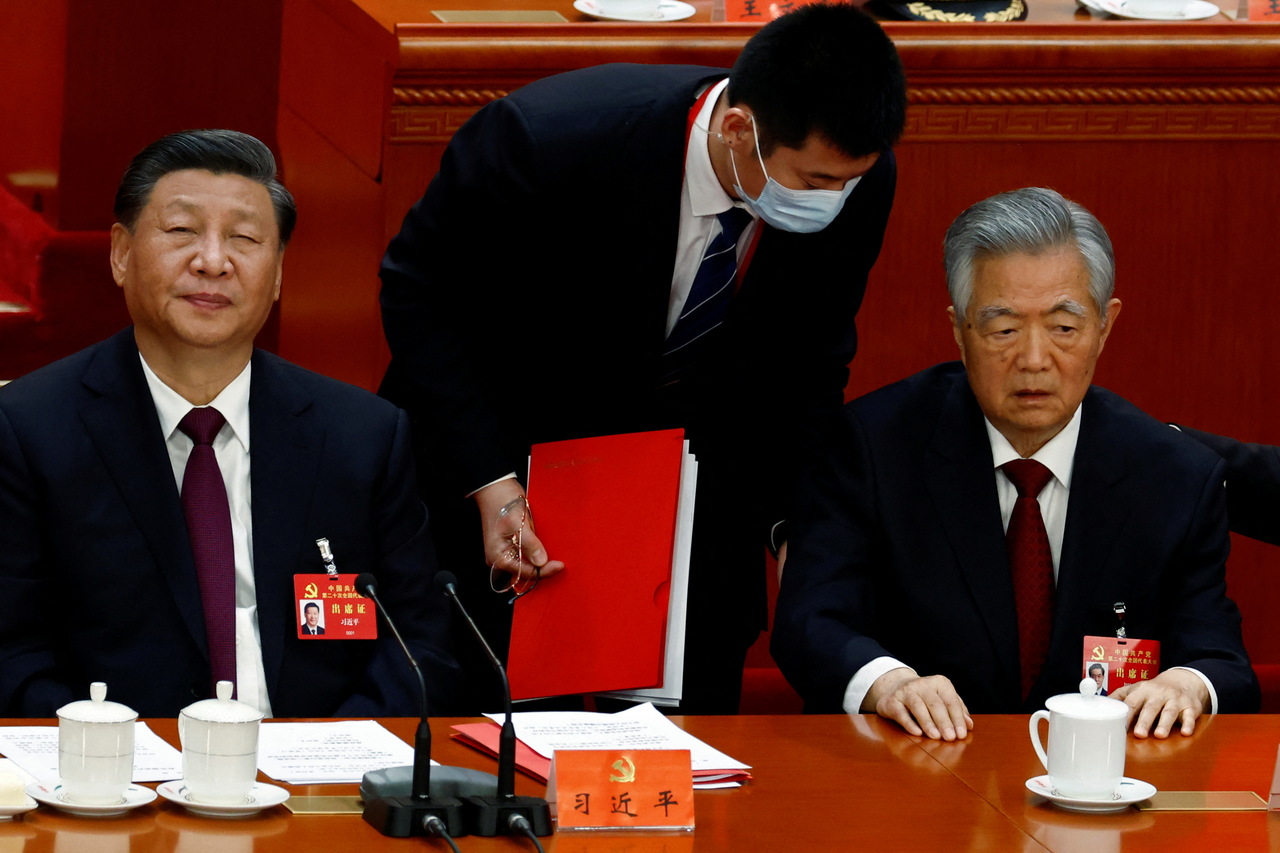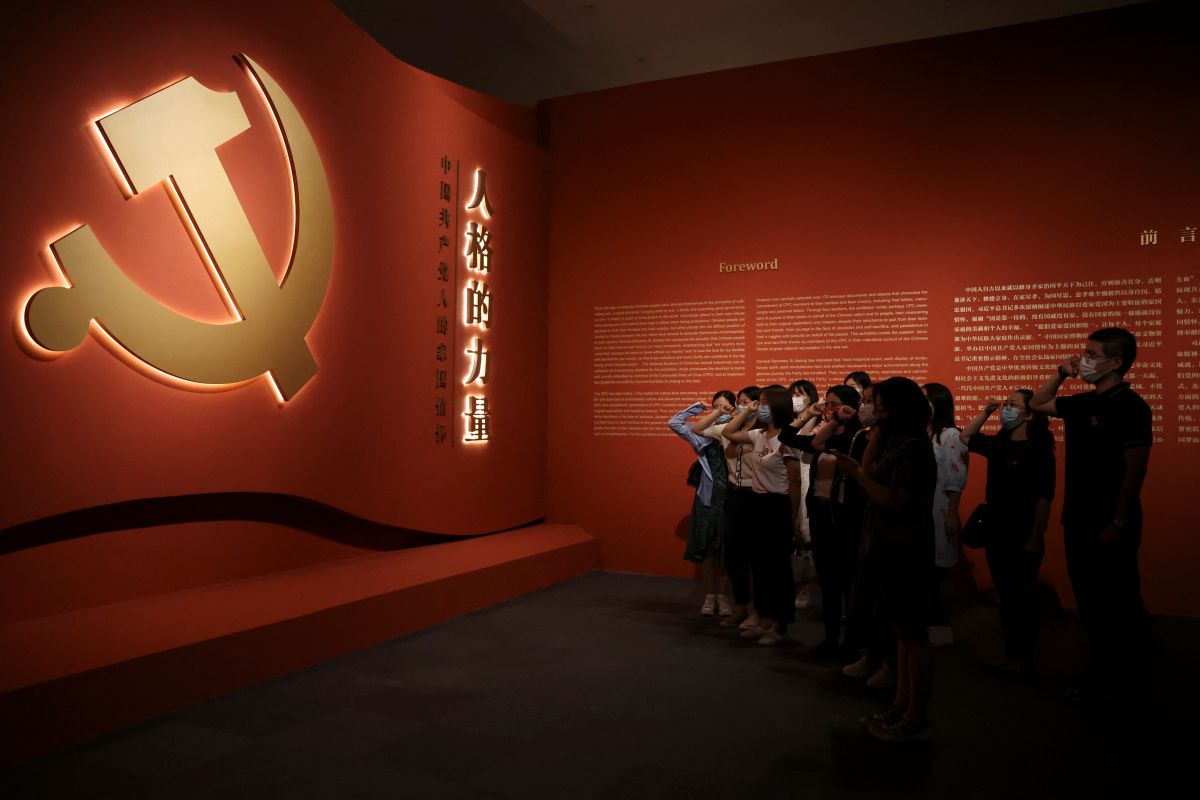20th Congress of the CPC Witnesses Xi Jinping's Domination and Puts Emphasis on China's Security
The 20th Congress of the Communist Party of China (CPC) on 16-22 October and the first plenary session of the new Central Committee on 23 October confirmed the dominant position of Xi Jinping. He was elected the party’s secretary-general for the third time, and his protégés dominated the Standing Committee of the Politburo—the most important decision-making body. The course of the congress showed the growing importance of security in party politics.
 TINGSHU WANG/ Reuters/ FORUM
TINGSHU WANG/ Reuters/ FORUM
What is the main function of the CPC Congress?
According to statute, the Congress of the Communist Party of China is the party’s most important decision-making body. It is also the most significant political event in China. It is organised every five years. Delegates accept the Secretary-General’s report on the work of the outgoing Central Committee (CC), amend the party’s statute and elect a new Central Committee and a Central Commission for Discipline Inspection. Immediately after the end of the Congress, the first plenary session of the new CC takes place, which elects the party’s most important governing bodies: the Political Bureau (Politburo, PB), the Standing Committee (SC), the secretary-general and members of the Central Military Commission. The report on the work of the Central Committee, changes in the statute, and the composition of the leading bodies, especially the PB and SC, and the person of the party leader, indicate the policy directions for the next five years.
What were the main themes in the report on the work of the Central Committee?
China is facing both internal threats, including a difficult economic and social situation (e.g., growing social inequalities), and external ones, including the rivalry with the U.S. Global factors, including the COVID-19 pandemic, protectionism in international trade, the slowdown in the global economy, and ongoing regional conflicts and disputes also have hampered the implementation of China’s interests. The CPC itself has internal challenges, as evidenced by corruption scandals and problems with the discipline of provincial authorities in implementing the policies of the central authorities, such as in the real estate sector. Xi stressed the need for additional effort of party apparatus in implementing CPC policy. In his opinion, due to the growing economic problems and the complicated international situation, the next five years will be crucial for the success of China’s plans, but also much more difficult than the previous five years.
What were the most important personnel decisions?
Xi Jinping became the party’s secretary-general for the third time. In addition, the most important leadership groups, the CC, PB, and SC, were dominated by his supporters, while the supporters of the former party leader, Hu Jintao, were absent. The current prime minister, Li Keqiang, and the chairman of the Chinese People’s Political Consultative Conference, Wang Yang, were not elected to the CC, as they are associated with Hu. In addition, Hu Jintao was publicly removed from the closing ceremony. The Central Committee also did not include Deputy Prime Minister Liu He, Yi Gang (president of the People’s Bank of China), or Liu Kun (finance minister). The politician responsible for economic issues in the party will most likely be He Lifeng, elected to the PB and currently the head of the National Development and Reform Commission.
In the seven-member SC, Li Qiang, the current secretary of the CPC in Shanghai, became number two. In March 2023, during the parliamentary session, he will most likely become prime minister. Zhao Leji, the former head of the Central Discipline Commission and the likely chairman of the Chinese parliament, and Wang Huning, Xi’s chief ideologist and adviser, most likely the future head of the Chinese People’s Political Consultative Conference, maintained their membership in the SC. Cai Qi, the party’s secretary in Beijing and the current head of the Secretariat of the Central Committee, Ding Xuexiang, the first deputy prime minister since March 2023, and Li Xi (head of the CPC in Guangdong province, and now chairman of the Central Discipline Commission), were also promoted to the Standing Committee.
What issues are most important on the CPC’s agenda?
The CPC upheld its main goals so far, which include building a developed state “until 2049” and the “rejuvenation of the Chinese nation” as part of the modernisation of China. In this context, in the next five years the key is not only to strengthen the Chinese economy, increase the national income and improve living conditions but also to expand the scientific and technological potential and increase China’s independence in this field. By 2027, the armed forces are to achieve modernisation goals, and the role of China in international organisations is also to increase. At the same time, in the statute, the party emphasises the desire to build a socialist economy, including the development of the concept of “double circulation” and “common prosperity”. The CPC also included in the document the key issues of improving discipline in the party apparatus, the improvement of management processes and opposition to the possible independence of Taiwan.
What domestic policy will the Chinese authorities pursue?
The effects of the congress indicate the strengthening of centralism, supervision, and control by the CPC over society and the apparatus built during Xi’s previous terms. This means, among others, no prospects for a quick end to the zero-Covid policy. Security issues are of particular importance for the party, both in the economic context (e.g., limiting the effects of U.S. sanctions in the semiconductor sector) and social stabilisation (e.g., intensifying supervision over culture or education). The concepts of “double circulation” or “common prosperity” will be implemented mainly in the context of developing the internal potential of China and minimising dependence on cooperation with foreign countries, and not real support, for example, for the middle class, which would be politically too risky for the CPC. Such a policy is also intended to mitigate the negative effects of weaker economic growth than before, which China is likely to experience in the longer term.
Will there be changes in foreign policy?
Personnel decisions of the Congress mean a change of China’s foreign minister is probable. The now former head of diplomacy, Wang Yi, has been promoted to the PB and will most likely become director of the CC’s Foreign Affairs Commission. The candidates for the head of the Ministry of Foreign Affairs were elected to the new Central Committee—the current Chinese ambassador to the U.S., Qin Gang, and the former deputy minister of the Ministry of Foreign Affairs, Liu Haixing, currently a director in the National Security Commission at the CC dealing with the coordination of state security issues. According to analysis of the situation presented at the congress by Xi, the interests of China are threatened by, among others, external factors, and this requires decisive action against “intimidation and pressure” on China, probably with U.S. policy in mind. In response to the threats, China’s priority will be to continue the development of its technological potential (particularly the semiconductor sector), the use of hybrid instruments (e.g., disinformation), but also building up the armed forces. Amendments to the statute and the meaning of Xi’s report confirm China’s plans for Taiwan, including the possibility of using force to take over the island. Implementation of these aims is, however, rather longer-term and will depend on, among others, the attitude of the U.S. and the EU, as well as on the course of Russia’s war with Ukraine. The desire to change the international order to include a greater role for China will remain a permanent item on the foreign policy agenda and also one of the main reasons for China’s continued support of Russia.





